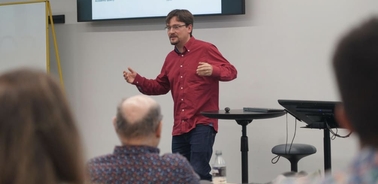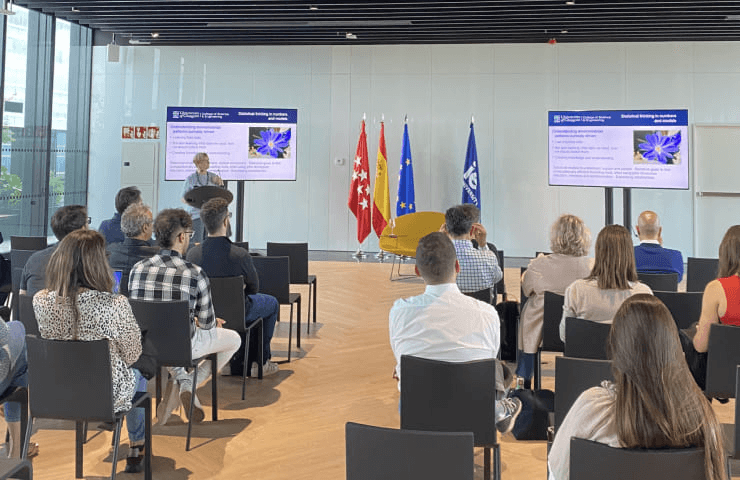IE Launches the IE-RSME Workshop Series on Applied Mathematics

The first in the workshop series hosted by IE School of Science and Technology discussed sustainability and climate change.
The Royal Spanish Society of Mathematics (RSME) and IE School of Science and Technology organized the first joint workshop dedicated to exploring the application of mathematics in the context of climate change and sustainability on May 29th, marking the beginning of a series outlined in the recent accord to foster cultural, scientific, and academic collaboration.
Industry professionals discussed leveraging mathematical principles to address environmental challenges. The workshop also provided a platform for prominent researchers in the field of applied mathematics to present and explain their projects using concise quick-paced lightning presentations of two minutes accompanied by a single slide.
Professor Ricardo García Herrera from Complutense University initiated the workshop with an analysis of the physical basis of climate change and reviewed the more recent climate data. He also discussed the agreement between the observational evidence and the scenarios derived from climate models.
“Governments agreed on stopping climate change, but there are many actions to take. How would you stop flights? Commuting? These changes involve a shift in the way of living,” he said. “Politicians work on a 4 year scale, and we expect them to work on a 30 year scale. We need a big crisis due to climate change in order to make the world react.”
Vicenzo Nava, a senior researcher at BCAM, described the challenges of offshore wind energy projects and posed the question: “is renewable energy always sustainable?” In his talk, Nava showed examples of the current research lines that aim to improve the viability of offshore wind solutions during the project lifecycle.
Following the lightning presentations by some researchers in the field, Marta Enesco Garrido, business consultant at NTT Data, focused on efficiency in the Utilities sector through advanced analytics. Enesco tackled how the carbon footprint of the Utilities sector can be reduced by improving physical assets and commodities management. Thus, she brought a corporate perspective on sustainability, highlighting how efficient infrastructure can contribute to achieving the sustainability goals proposed by the European Union. In a similar perspective, María Erquiaga Mendoza, Senior Manager at BBVA and IE Business School MBA graduate, proved to the audience that companies are including sustainability in their overall strategy. For instance, BBVA is focusing on two main areas: climate action and inclusive growth. Erquiaga said: “to achieve this, BBVA works towards supporting business growth while also managing their own environmental impact.”
The conversation moved to the maritime environment. Roberto Mínguez Solana, who holds a Ph.D. in Applied Mathematics, discussed how water utilities can use Artificial Intelligence to maximise information and data to make better decisions while enhancing service delivery and reducing costs. Meanwhile, David Gómez-Ullate Oteiza, a professor of Applied Mathematics at IE, explained how the optimization of maritime routes can lead to significant energy savings and pollution reduction.
Finally, the afternoon session featured a talk by Marian Scott from the University of Glasgow, highlighting the role of mathematics, statistics, and modelling in understanding and mitigating environmental crises.
